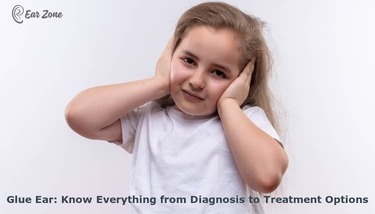
By Dr. Lusine Mamikonyan, ENT physician, Masters in Public Health.
Know more about Dr. Lusine Mamikonyan
As a parent, sometimes it is difficult to know the cause of your baby’s discomfort, especially when they’re too young to communicate. One of the most common ailments that infants experience is an ear infection, or Otitis Media – an infection of the middle ear. In fact, it’s the second most common ailment after the common cold. Although otitis media can occur at any age, it is most commonly seen between the ages of 6 to 24 months. Approximately 80% of all children will experience a case of otitis media during their lifetime.1
Ear Infections in babies can be a painful and distressing condition, and it’s important to recognize the symptoms early on. In this article, we will cover everything you should know to identify the symptoms of ear Infection in babies and how to treat the infection.
What Causes Ear Infection in Babies?
Although there are many causes of otitis media or middle ear infection, Eustachian tube dysfunction and nasal inflammation caused by allergic rhinitis or upper respiratory infection are the common causes. Bacteria or viruses enter the middle ear causing inflammation and fluid buildup, leading to an ear infection.
Symptoms of Ear Infection in Babies
Below are the most common symptoms of ear infection in babies:
1. The Baby Pulls or Keeps Tugging It’s Ears
If your baby is constantly pulling or tugging it’s ear, it could be a symptom of an ear infection. This is because the ear is hurting, and your baby is trying to reduce the discomfort.
Parents should remember that tugging or pulling of the ears can also be due to discomfort if the baby is teething.
2. The Baby Shows Signs of Irritability
This is a very common symptom of ear infection in babies. Ear infections can be painful, and your baby might cry or is more fussy than usual. An irritated child is very restless and will neither sleep nor drink or eat.
3. The Baby Cries More if Put to Sleep

This is one of the indicators that the baby has an ear infection. The restlessness is due to the discomfort and the pressure on the Eustachian tube when the baby is lying on its back.
The Eustachian Tube is a tube that connects the ear to the throat, it equalizes the pressure between the outer ear and the middle ear. In case of an infection, the swelling in the Eustachian tube creates an obstacle and does not allow equalization of pressure. This increases the pressure in the middle ear, causing additional discomfort or pain.
4. Loss of Appetite
Ear infection in babies is generally accompanied by loss of appetite. Does your baby refuse to drink milk beyond a few sips? It is due to the pain and discomfort in the ears caused by the swallowing action. Ear infection in babies can also cause nausea.
5. Ear Drainage from the Baby’s Ears
Otitis media with effusion or discharge from the ears is another symptom of ear Infection in babies. You will notice a yellowish or white liquid draining from the ears. (Note: otitis media is not always accompanied by ear discharge)
6. Balancing Issues or Clumsy Movement
Since the organs responsible for the balance are located in the ear, inflammation or accumulation of liquid can temporarily affect these organs. This may affect the baby’s balance while walking or result in clumsy movement.
7. The Baby Does Not Respond to Sounds
If your baby is not responding to the usual sounds he or she normally does, it is due to temporary hearing loss. The accumulation of fluid in the ears creates a blockage. The blockage does not allow the sound to travel to the inner ear.
Otitis media also causes impairment of the eardrum or tympanic membrane. The baby will respond and will hear normally once the infection clears up.
8. The Baby Has Fever
Fever is a sign that your baby’s body is fighting an infection. Though, there are many other causes of fever. One should be aware that if the fever accompanies a common cold or is immediately after a cold, the chances of an ear infection in the baby are high.
9. Unpleasant Smell from the Baby’s Ears
The baby may emit an unpleasant smell from the ears, at times the build-up of pus results in a foul and unpleasant smell.
Otitis media with effusion (OME) or glue ear is a common condition that mostly affects children. Glue ear, sometimes called sticky ear occurs when fluid builds up behind the eardrum or in the middle ear. Read more about glue ear diagnosis and treatment options.
Reasons for Ear Infections in Babies
While ear infection in babies is very common, there are certain factors that increase the chances of ear infection.
- The chances of ear infection in babies between the ages of 6-18 months are higher as their immune system is still developing. Even a mild infection should be taken care of immediately.
- Probability of ear infection in babies is higher if the parents have a history of ear infections.
- Babies who attend group childcare are more likely to get ear infections because they are exposed to other babies who may have an ear infection.
- Exposure to secondhand smoke can cause irritation and increase the risk of ear infection in babies.
- Babies who are bottle-fed and are fed while lying down are more likely to get ear infections as there are chances of milk entering the Eustachian tube.
- The baby’s Eustachian tubes, which connect the middle ear to the back of the throat, are short and straight whereas the gown person’s Eustachian tube is angled downwards. This makes it easier for bacteria or viruses to travel from the throat to the middle ear 2.
According to Dr. Jasmin Makar, MD, a pediatrician at Town and Country Pediatrics – San Francisco, “For younger kids, it can be an especially difficult and challenging issue. The frequent ear infections have a lot to do with the anatomy of their ears and the overall immaturity of their immune system. They can’t equalize the pressure in their ears as easily as older kids and adults.” - Since the tube is straight, water tends to collect in the tube instead of draining out. This is an ideal condition for germs and bacteria to grow.
- The Common cold is one of the primary causes of ear infection in babies. Studies show that a child catches a common cold as many as 8 to 10 times a year before they reach the age of 2 years 3.
- Enlarged adenoids can also cause otitis media. Adenoids are tissues that are found at the back of the nasal passage. Although adenoids trap germs and bacteria, enlarged adenoids are known to cause ear infection
How to Prevent Ear Infection in Babies?

- Vaccinate the baby against influenza every year.
- Vaccinate the baby with pneumococcal conjugate vaccine (PCV)
- Raise the head of the baby if being fed with a bottle. This prevents milk from getting into the Eustachian tube and causing an ear infection.
- Parents and visitors should strictly avoid smoking around the baby.
- Breastfed babies have a lower risk of getting ear infections than bottle-fed babies, though proper bottle-feeding techniques also lower the risk.
How Long Does an Ear Infection Last in Babies?
Mild ear infection in babies will go away on their own. Ideally, you should wait for a day or two before starting antibiotics. The baby will experience some discomfort during the recovery period, using a warm compress or giving a prescribed painkiller can give some relief from pain.
Keep the doctor informed about the situation, if the ear infection persists, the doctor will prescribe antibiotics. Your baby will start feeling better in a day or two after the antibiotic treatment.
Complications of Otitis Media
It is not advisable to neglect otitis media as it can cause complications 4. Some of the complications are:
- Mastoiditis
- Cholesteatoma
- Labyrinthitis
- Speech and language development issues
- Meningitis
- Facial paralysis
- Brain abscess
When to Seek Medical Attention for Ear Infections in Babies
These are the other symptoms that indicate your baby needs medical attention for otitis media or ear infections:
- An immediate visit to the doctor is advised if the baby has other underlying health conditions like respiratory disorder or immune deficiency.
- Your baby is younger than 6 months old and has a fever of 100.4°F (38°C) or higher.
- Your baby is between 6-24 months old and has a fever of 102.2°F (39°C) or higher.
- Your baby is experiencing severe pain or discomfort and home remedies are not helping.
- Your baby has pus or other fluid draining from their ear.
- Your baby’s symptoms last longer than a day or two.
How To Treat an Ear Infection in Babies
The doctor will take a look inside the ear with an otoscope and ask questions about the baby’s health and sleep pattern. Once ear infection is confirmed, the doctor may prescribe antibiotics, such as amoxicillin, to be taken over seven to 10 days.
If the ear infection does not go away naturally, it is advisable to consult your doctor for advice. Avoid delay in treatment of ear infection in babies if they are under the age of 6 months. Since their immune system is not fully developed, there are chances of the infection spreading.
The doctor may also recommend over-the-counter pain relievers such as acetaminophen or ibuprofen, or ear drops, to help with the fever and pain 2.
Checkout our article on how to relieve itchy ears?
Precautions And Home Remedies to Prevent Ear Infection in Babies
While you wait for the ear infection to go away naturally or the antibiotics to work, you can try the following to help your baby feel comfortable.
- Hold a warm, damp compress against your baby’s ear to help relieve pain and discomfort.
- Do not allow pets into the room if the baby is suffering from an ear infection
- Avoid giving stuffed toys to the baby during the infection period.
- Reduce the use of pacifiers during the ear infection period
- Maintain proper room temperature and ventilation
- Wash and disinfect your hands before handling the baby
- Make sure your baby gets plenty of rest and stays hydrated.
- Use over-the-counter pain medication recommended by your doctor.
- Over-the-counter ear drops can help reduce inflammation and pain. However, it is important to consult with your doctor before using any medication.
Ear infection in babies is a common ailment, but it can be painful and distressing for your little one. Knowing the symptoms of an ear infection can help you identify and treat the condition before it becomes serious. It is important to seek medical help, with proper treatment and prevention, you can help your baby stay healthy and happy.




